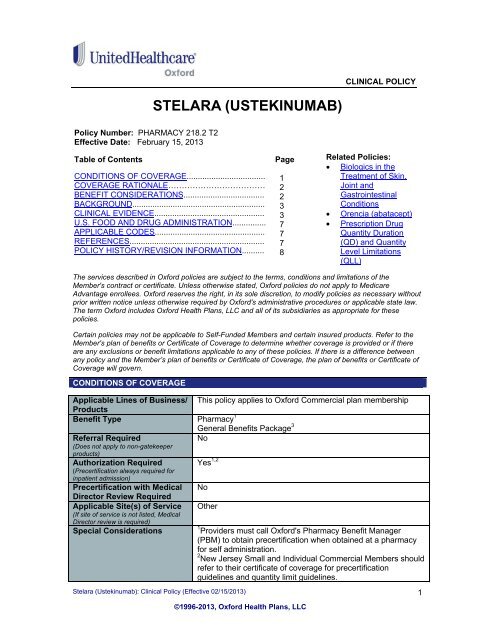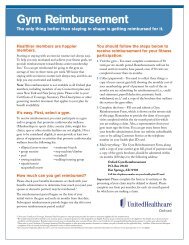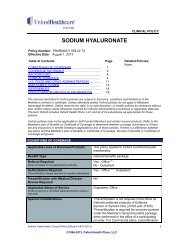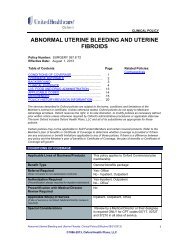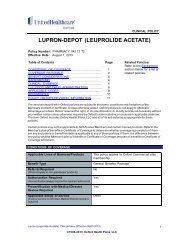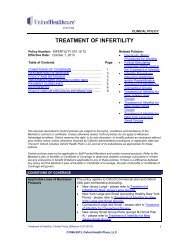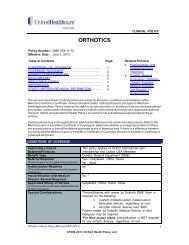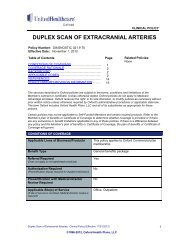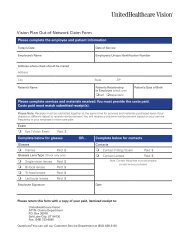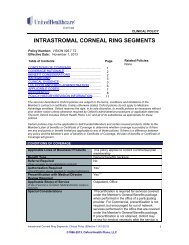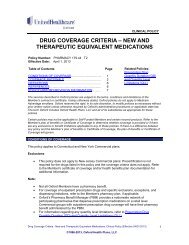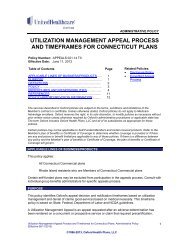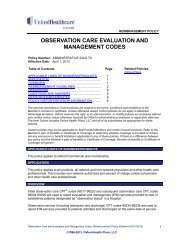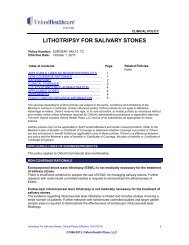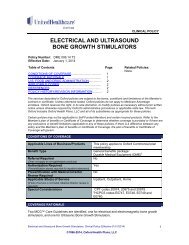STELARA (USTEKINUMAB) - Oxford Health Plans
STELARA (USTEKINUMAB) - Oxford Health Plans
STELARA (USTEKINUMAB) - Oxford Health Plans
Create successful ePaper yourself
Turn your PDF publications into a flip-book with our unique Google optimized e-Paper software.
Policy Number: PHARMACY 218.2 T2<br />
Effective Date: February 15, 2013<br />
Table of Contents<br />
<strong>STELARA</strong> (<strong>USTEKINUMAB</strong>)<br />
CONDITIONS OF COVERAGE...................................<br />
COVERAGE RATIONALE………………………………<br />
BENEFIT CONSIDERATIONS....................................<br />
BACKGROUND...........................................................<br />
CLINICAL EVIDENCE.................................................<br />
U.S. FOOD AND DRUG ADMINISTRATION...............<br />
APPLICABLE CODES.................................................<br />
REFERENCES............................................................<br />
POLICY HISTORY/REVISION INFORMATION..........<br />
Policy History Revision Information<br />
Stelara (Ustekinumab): Clinical Policy (Effective 02/15/2013)<br />
©1996-2013, <strong>Oxford</strong> <strong>Health</strong> <strong>Plans</strong>, LLC<br />
CLINICAL POLICY<br />
The services described in <strong>Oxford</strong> policies are subject to the terms, conditions and limitations of the<br />
Member's contract or certificate. Unless otherwise stated, <strong>Oxford</strong> policies do not apply to Medicare<br />
Advantage enrollees. <strong>Oxford</strong> reserves the right, in its sole discretion, to modify policies as necessary without<br />
prior written notice unless otherwise required by <strong>Oxford</strong>'s administrative procedures or applicable state law.<br />
The term <strong>Oxford</strong> includes <strong>Oxford</strong> <strong>Health</strong> <strong>Plans</strong>, LLC and all of its subsidiaries as appropriate for these<br />
policies.<br />
Certain policies may not be applicable to Self-Funded Members and certain insured products. Refer to the<br />
Member's plan of benefits or Certificate of Coverage to determine whether coverage is provided or if there<br />
are any exclusions or benefit limitations applicable to any of these policies. If there is a difference between<br />
any policy and the Member’s plan of benefits or Certificate of Coverage, the plan of benefits or Certificate of<br />
Coverage will govern.<br />
CONDITIONS OF COVERAGE<br />
Applicable Lines of Business/<br />
Products<br />
Benefit Type<br />
Referral Required<br />
(Does not apply to non-gatekeeper<br />
products)<br />
Authorization Required<br />
(Precertification always required for<br />
inpatient admission)<br />
Precertification with Medical<br />
Director Review Required<br />
Applicable Site(s) of Service<br />
(If site of service is not listed, Medical<br />
Director review is required)<br />
Special Considerations<br />
This policy applies to <strong>Oxford</strong> Commercial plan membership<br />
Pharmacy 1<br />
General Benefits Package 3<br />
No<br />
Yes 1,2<br />
No<br />
Other<br />
Page<br />
1<br />
2<br />
2<br />
3<br />
3<br />
7<br />
7<br />
7<br />
8<br />
Related Policies:<br />
Biologics in the<br />
Treatment of Skin,<br />
Joint and<br />
Gastrointestinal<br />
Conditions<br />
Orencia (abatacept)<br />
Prescription Drug<br />
Quantity Duration<br />
(QD) and Quantity<br />
Level Limitations<br />
(QLL)<br />
1 Providers must call <strong>Oxford</strong>'s Pharmacy Benefit Manager<br />
(PBM) to obtain precertification when obtained at a pharmacy<br />
for self administration.<br />
2 New Jersey Small and Individual Commercial Members should<br />
refer to their certificate of coverage for precertification<br />
guidelines and quantity limit guidelines.<br />
1
Special Considerations<br />
(continued)<br />
COVERAGE RATIONALE<br />
Stelara (Ustekinumab): Clinical Policy (Effective 02/15/2013)<br />
3<br />
Precertification is not required when provided in an office or<br />
outpatient setting.<br />
Ustekinumab is considered medically necessary for the treatment of plaque psoriasis when all<br />
of the following criteria are met:<br />
Initial Therapy<br />
Member has a diagnosis of moderate to severe plaque psoriasis; and<br />
Member is not receiving ustekinumab (Stelara) in combination with another infused or<br />
self-injected biologic agent (e.g., tocilizumab (Actemra), belimumab (Benlysta),<br />
etanercept (Enbrel), adalimumab (Humira), certolizumab (Cimzia), golimumab (Simponi),<br />
alefacept (Amevive), rituximab (Rituxan), infliximab (Remicade), or abatacept (Orencia)<br />
Initial Approval: 12 months<br />
Reauthorization<br />
Documentation that Member continues to receive clinical benefit from ongoing treatment with<br />
Stelara<br />
Reauthorization Approval: 12 months<br />
Additional information from the manufacturer’s labeling:<br />
Stelara (ustekinumab) is indicated for the treatment of adult patients (18 years or older) with<br />
moderate to severe plaque psoriasis who are candidates for phototherapy or systemic therapy. 1<br />
Ustekinumab is NOT medically necessary for the treatment of<br />
1. Psoriatic arthritis<br />
2. Crohn’s disease<br />
3. Multiple sclerosis<br />
The findings of available studies are limited by short duration and/or relatively small patient<br />
population. Larger and longer term phase III studies are needed to further characterize<br />
ustekinumab efficacy and safety for treatment of psoriatic arthritis and Crohn’s disease.<br />
In available studies, ustekinumab does not demonstrate efficacy in the treatment of multiple<br />
sclerosis.<br />
BENEFIT CONSIDERATIONS<br />
Not all <strong>Oxford</strong> Members have a pharmacy benefit.<br />
For coverage of outpatient prescription drugs and specific exclusions, exceptions, and<br />
dispensing limitations, refer to the Member's pharmacy plan, if applicable.<br />
<strong>Oxford</strong>'s Pharmacy Benefit Manager (PBM) provides a nationwide network of<br />
participating pharmacies that administer prescription drugs on a retail level. Groups that<br />
purchase the Outpatient Prescription Drug Rider will have their retail pharmacy benefit<br />
administered by the PBM.<br />
For information regarding any quantity level limitations, refer to Prescription Drug<br />
Quantity Duration (QD) and Quantity Level Limitations (QLL)<br />
For information on coverage for Orencia intravenous infusion, refer to: Orencia<br />
(abatacept).<br />
©1996-2013, <strong>Oxford</strong> <strong>Health</strong> <strong>Plans</strong>, LLC<br />
2
For Information regarding coverage for Enbrel, Humira, Kineret, Cimzia, Simponi, and<br />
Orencia (subcutaneous formulation), refer to: Biologics in the Treatment of Skin, Joint<br />
and Gastrointestinal Conditions.<br />
Some states mandate benefit coverage for off-label use of medications for some<br />
diagnoses or under some circumstances. Some states also mandate usage of other<br />
Compendium references. Where such mandates apply, they supersede language in the<br />
benefit document or in the notification criteria.<br />
BACKGROUND<br />
Ustekinumab is a human IgG1κ monoclonal antibody that binds with high affinity and specificity to<br />
the p40 protein subunit used by both the interleukin (IL)-12 and IL-23 naturally occurring<br />
cytokines. IL-12 and IL-23 are involved in inflammatory and immune responses, such as natural<br />
killer cell activation and CD4+ T-cell differentiation and activation. 1<br />
CLINICAL EVIDENCE<br />
Medically Necessary Use:<br />
Plaque Psoriasis<br />
Two multicenter, randomized, double-blind, placebo-controlled studies (PHOENIX-1 and<br />
PHOENIX-2) were considered in the approval of ustekinumab for the treatment of plaque<br />
psoriasis. 1 Enrollment consisted of a total of 1996 subjects 18 years of age and older with plaque<br />
psoriasis who had a minimum body surface area involvement of 10%, and Psoriasis Area and<br />
Severity Index (PASI) score ≥12, and who were candidates for phototherapy or systemic therapy.<br />
Subjects with guttate, erythrodermic, or pustular psoriasis were excluded from the studies.<br />
Leonardi et al. conducted a phase III, parallel, double-blind, placebo-controlled study (PHOENIX-<br />
1) in 766 patients with moderate-to-severe psoriasis. 8 Subjects were randomly assigned to<br />
receive ustekinumab 45 mg (n=255) or 90 mg (n=256) at weeks 0 and 4 and then every 12<br />
weeks; or placebo (n=255) at weeks 0 and 4, with subsequent crossover to ustekinumab at week<br />
12. Patients who were initially randomized to receive ustekinumab at week 0 and achieved longterm<br />
response (at least 75% improvement in psoriasis area and severity index [PASI 75] at weeks<br />
28 and 40) were randomized a second time at week 40 to maintenance ustekinumab or<br />
withdrawal from treatment until loss of response. The primary endpoint was the proportion of<br />
patients achieving PASI 75 at week 12. Analyses were by intent to treat and resulted in the<br />
following: 171 (67·1%) patients receiving ustekinumab 45 mg, 170 (66·4%) receiving ustekinumab<br />
90 mg, and eight (3·1%) receiving placebo achieved PASI 75 at week 12 (difference in response<br />
rate vs placebo 63·9%, 95% CI 57·8–70·1, p
y intent to treat and resulted in the following: 273 (66.7%) patients receiving ustekinumab 45 mg,<br />
311 (75.7%) receiving ustekinumab 90 mg, and 15 (3.7%) receiving placebo achieved the primary<br />
endpoint (difference in response rate 63.1%, 95% CI 58.2–68.0, p
function and HRQoL in patients with PsA and psoriasis involving at least 3% BSA. However, the<br />
findings of this study are limited by its short duration and relatively small patient population.<br />
Gottlieb et al. conducted a phase II double-blind, randomized, placebo-controlled, crossover<br />
study at 24 sites in North America and Europe. 3 Patients with active psoriatic arthritis were<br />
randomly assigned to receive subcutaneous injections of either ustekinumab 90 mg every week<br />
for 4 weeks (weeks 0–3; total dose 360 mg) followed by placebo at weeks 12 and 16 (Group 1),<br />
or placebo (weeks 0–3) followed by ustekinumab 90 mg at weeks 12 and 16 (total dose 180 mg;<br />
Group 2). The first 12 weeks of the study were placebo-controlled. Masking was maintained to<br />
week 16, and patients were followed up to week 36.<br />
The primary study endpoint was ACR20 response at week 12. In the intent to treat analysis, 32<br />
(42%) patients in Group 1 and ten (14%) in Group 2 achieved the primary endpoint (difference<br />
28% [95% CI 14.0-41.6]; p=0.0002). Of 124 (85%) participants with psoriasis affecting 3% or<br />
more body surface area, 33 of 63 (52%) in Group 1 and three of 55 (5%) in Group 2 had a 75% or<br />
greater improvement in psoriasis area and severity index score at week 12 (47% [33.2-60.6];<br />
p
associated with CD in the colon and ileum as reflected by higher CRP concentrations. The<br />
investigators stated that potential benefit of ustekinumab in CD is supported by serum CRP<br />
reductions. Evidence suggests that increased systemic inflammation as manifested by higher<br />
baseline CRP values leads to larger treatment effects with ustekinumab, especially in infliximabexperienced<br />
patients. Despite these conclusions, further study is needed to confirm whether<br />
change in serum CRP correlates with long-term clinical efficacy in the treatment of Crohn’s<br />
disease.<br />
Multiple Sclerosis<br />
Kasper et al. conducted a phase I, double-blind, placebo-controlled, sequential dose escalation<br />
study in 20 subjects with multiple sclerosis (MS). 9 Subjects were randomized (4:1) to receive a<br />
single subcutaneous injection of either ustekinumab (0.3, 0.75, 1.5, and 3 mg/kg) or placebo.<br />
Clinical and laboratory evaluations were performed through 16 weeks following administration.<br />
Single subcutaneous administrations of ustekinumab in this first study of relapsing MS were<br />
generally well tolerated. Adverse events were generally mild or moderate, with no apparent doserelated<br />
trends. There was a large degree of variability in T2 lesion volume and total number of<br />
gadolinium-positive lesions, both unaffected by dose escalation. Three relapses of MS occurred<br />
in two placebo-treated subjects. Over the range of single doses studied, the median Tmax ranged<br />
from 9.0 to 16.5 days, and the median T1/2 ranged from 20.2 to 30.9 days. The authors concluded<br />
that safety of ustekinumab in MS needs to be tested in a study of longer duration and involving a<br />
larger cohort of subjects.<br />
In a phase II, multicenter, randomized, double-blind, placebo-controlled trial, Segal et al. studied<br />
repeated injections of ustekinumab in patients (n=249) with relapsing-remitting multiple sclerosis<br />
(RRMS). 10 Subjects aged 18-65 years were assigned to one of five groups: placebo (n=49) or<br />
four different ustekinumab dosages (n=50 for all) at weeks 0, 1, 2, 3, 7, 11, 15, and 19.<br />
Ustekinumab doses were 27 mg, 90 mg q8w, 90 mg, or 180 mg; the 90 mg q8w dosage group<br />
received placebo substitute at weeks 7 and 15. The primary endpoint was the cumulative number<br />
of new gadolinium-enhancing T1-weighted lesions on serial cranial MRI through week 23.<br />
Patients were followed up through week 37. In the intent to treat analysis, ustekinumab treatment<br />
did not show a significant reduction in the primary endpoint for any dosage groups versus<br />
placebo. At week 37, adverse events occurred in 38 (78%) placebo-treated patients and 170<br />
(85%) ustekinumab-treated patients, with infections most commonly reported. Serious adverse<br />
events occurred in one (2%) placebo-treated patient and six (3%) ustekinumab-treated patients.<br />
Malignant diseases were reported in two patients shortly after the initiation of ustekinumab<br />
treatment; both patients were withdrawn from the trial and given appropriate treatment, which<br />
resulted in complete remission. No serious infections, cardiovascular events, or exacerbation of<br />
demyelinating events occurred. A dose-dependent increase in serum concentrations of<br />
ustekinumab was recorded. The investigators concluded that ustekinumab is generally well<br />
tolerated but does not show efficacy in reducing the cumulative number of gadolinium-enhancing<br />
T1-weighted lesions in multiple sclerosis.<br />
Professional Societies<br />
The American Academy of Dermatology guidelines of care for the management of psoriasis<br />
and psoriatic arthritis (PsA) state that patients with limited skin disease should not automatically<br />
be treated with systemic treatment if they do not improve, because treatment with systemic<br />
therapy may carry more risk than the disease itself. 11<br />
The strength of AAD recommendations for the treatment of moderate to severe plaque psoriasis<br />
using ustekinumab is A (highest recommendation; level I evidence). Compared with the TNF-alfa<br />
inhibitors, the most comprehensive ustekinumab safety data to date come from a pooled analysis<br />
of phase II and phase III clinical trials involving slightly more than 3,000 patients with just over 3<br />
years of continuous therapy. Therefore, the use of registries to monitor the long-term safety of<br />
ustekinumab and other new agents currently under development, and to monitor the long-term<br />
safety of all of the systemic agents available, is an essential step in defining the long-term<br />
adverse effects of ustekinumab and other new agents. 12<br />
Stelara (Ustekinumab): Clinical Policy (Effective 02/15/2013)<br />
©1996-2013, <strong>Oxford</strong> <strong>Health</strong> <strong>Plans</strong>, LLC<br />
6
When considering the use of ustekinumab for PsA, the AAD states that until the results of<br />
ongoing phase III trials of ustekinumab for PsA become available, the TNF-alfa inhibitors should<br />
be considered the biologic class of choice for these patients. 12<br />
U.S. FOOD AND DRUG ADMINISTRATION (FDA)<br />
Stelara (ustekinumab) is indicated for the treatment of adult patients (18 years or older) with<br />
moderate to severe plaque psoriasis who are candidates for phototherapy or systemic therapy. 1<br />
APPLICABLE CODES<br />
The codes listed in this policy are for reference purposes only. Listing of a service or device code<br />
in this policy does not imply that the service described by this code is a covered or non-covered<br />
health service. Coverage is determined by the Member’s plan of benefits or Certificate of<br />
Coverage. This list of codes may not be all inclusive.<br />
HCPCS Code Description<br />
J3357 Injection, ustekinumab, 1 mg<br />
ICD-9 Code Description<br />
696.1 Other psoriasis<br />
ICD-10 Codes (Preview Draft)<br />
In preparation for the transition from ICD-9 to ICD-10 medical coding on October 1, 2014 * , a<br />
sample listing of the ICD-10 CM and/or ICD-10 PCS codes associated with this policy has been<br />
provided below for your reference. This list of codes may not be all inclusive and will be updated<br />
to reflect any applicable revisions to the ICD-10 code set and/or clinical guidelines outlined in this<br />
policy. *The effective date for ICD-10 code set implementation is subject to change.<br />
ICD-10 Diagnosis Code<br />
(Effective 10/01/14)<br />
Description<br />
L40.0 Psoriasis vulgaris<br />
L40.1 Generalized pustular psoriasis<br />
L40.2 Acrodermatitis continua<br />
L40.3 Pustulosis palmaris et plantaris<br />
L40.4 Guttate psoriasis<br />
L40.8 Other psoriasis<br />
L40.9 Psoriasis, unspecified<br />
REFERENCES<br />
The foregoing <strong>Oxford</strong> policy has been adapted from an existing United<strong>Health</strong>care Pharmacy<br />
Clinical Pharmacy Program that was researched, developed and approved by the United<strong>Health</strong><br />
Group National Pharmacy & Therapeutics Committee<br />
1. Stelara [package insert]. Horsham, PA: Janssen Biotech, Inc; August 2011.<br />
2. Kavanaugh A, Menter A, Mendelsohn A, et al. Effect of ustekinumab on physical function<br />
and health-related quality of life in patients with psoriatic arthritis: a randomized, placebocontrolled,<br />
phase II trial. Curr Med Res Opin. 2010 Oct;26(10):2385-92.<br />
3. Gottlieb A, Menter A, Mendelsohn A, et al. Ustekinumab, a human interleukin 12/23<br />
monoclonal antibody, for psoriatic arthritis: randomised, double-blind, placebo-controlled,<br />
crossover trial. Lancet. 2009 Feb 21;373(9664):633-40. Epub 2009 Feb 11.<br />
4. Sandborn WJ, Feagan BG, Fedorak RN, et al. A randomized trial of Ustekinumab, a<br />
human interleukin-12/23 monoclonal antibody, in patients with moderate-to-severe<br />
Crohn's disease. Gastroenterology. 2008 Oct;135(4):1130-41. Epub 2008 Jul 17.<br />
Stelara (Ustekinumab): Clinical Policy (Effective 02/15/2013)<br />
©1996-2013, <strong>Oxford</strong> <strong>Health</strong> <strong>Plans</strong>, LLC<br />
7
5. Toedter GP, Blank M, Lang Y, et al. Relationship of C-reactive protein with clinical<br />
response after therapy with ustekinumab in Crohn's disease. Am J Gastroenterol. 2009<br />
Nov;104(11):2768-73. Epub 2009 Aug 11.<br />
6. Kasper, L.H., D. Everitt, T.P. Leist, et al. A phase I trial of an interleukin-12/23<br />
monoclonal antibody in relapsing multiple sclerosis. Curr Med Res Opin. 2006<br />
Sep;22(9):1671-8.<br />
7. Segal BM, Constantinescu CS, Raychaudhuri A, et al. Repeated subcutaneous injections<br />
of IL12/23 p40 neutralising antibody, ustekinumab, in patients with relapsing-remitting<br />
multiple sclerosis: a phase II, double-blind, placebo-controlled, randomised, dose-ranging<br />
study. Lancet Neurol. 2008 Sep;7(9):796-804.<br />
8. Leonardi CL, Kimball AB, Yeilding N, et al. Efficacy and safety of ustekinumab, a human<br />
interleukin-12/23 monoclonal antibody, in patients with psoriasis: 76-week results from a<br />
randomized, double-blind, placebo-controlled trial (PHOENIX-1). Lancet 2008;371:1665–<br />
74.<br />
9. Papp KA, Langley RG, Lebwohl M, et al. Efficacy and safety of ustekinumab, a human<br />
interleukin-12/23 monoclonal antibody, in patients with psoriasis: 52-week results from a<br />
randomized, double-blind, placebo-controlled trial (PHOENIX-2). Lancet 2008;371:1675–<br />
84.<br />
10. Griffiths CEM, Strober BE, van de Kerkhof P, et al. Comparison of ustekinumab and<br />
etanercept for moderate-to-severe psoriasis. N Engl J Med 2010;362:118-28.<br />
11. Menter A, Gottlieb A, Feldman SR, et al. Guidelines of care for the management of<br />
psoriasis and psoriatic arthritis section 1. Overview of psoriasis and guidelines of care for<br />
the treatment of psoriasis with biologics. J Am Acad Dermatol. 2008;58:826-50.<br />
12. Menter, A, Korman N, Elmets C, et al. Guidelines of care for the management of<br />
psoriasis and psoriatic arthritis section 6. Case-based presentations and evidence-based<br />
conclusions. J Am Acad Dermatol. Doi:10.1016/j.jaad.2010.11.055 [publication date: July<br />
2012].<br />
POLICY HISTORY/REVISION INFORMATION<br />
Date Action/Description<br />
Revised coverage rationale:<br />
02/15/2013<br />
o<br />
o<br />
Removed criteria for patients currently on therapy<br />
Added reauthorization criteria and approval period<br />
Archived previous policy version PHARMACY 218.1 T2<br />
Stelara (Ustekinumab): Clinical Policy (Effective 02/15/2013)<br />
©1996-2013, <strong>Oxford</strong> <strong>Health</strong> <strong>Plans</strong>, LLC<br />
8


